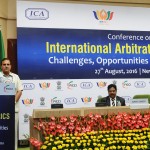India’s finance minister Arun Jaitley, at a conference on International Arbitration in BRICS, held in New Delhi recently, suggested setting up arbitration centres for BRICS nations[1] as alternatives to the existing arbitration hubs — London, Paris, New York or Singapore – all of which are increasingly seen to be favouring western parties.
However, setting up new centres in India may not necessarily lead to more parties choosing India for arbitration. The London Court of International Arbitration (LCIA) recently shut its operations in New Delhi owing to a lack of cases.[2]
One reason that parties hesitate to choose arbitration is because of a tangled history of interaction between the Indian judiciary and the arbitration process. Indian courts tend to be intrusive and easily drawn into arbitration proceedings, causing delays. This is true for both arbitrations held in India and abroad.
Take these two cases, for example:
- The 2002 ruling by the Supreme Court of India in the Bhatia International v Bulk Trading S.A.[3] case allowed Indian courts to interject even though the arbitration was being held abroad.
- In the 2008 Venture Global Engineering Case v Satyam Computer Services Ltd,[4] the Supreme Court held that it had power to disregard (“set aside”) an award passed by a tribunal in an international arbitration held abroad.
Both these rulings gave the Indian courts wider powers over international arbitration, even beyond those specified in the United Nations Convention on the Recognition and Enforcement of Foreign Arbitral Awards, 1958[5].
These powers have only recently begun to be revoked:
- In 2012, the Supreme Court overturned these judgments in the Bharat Aluminium v. Kaiser Aluminium Technical Services[6]
- In December 2014, the Supreme Court refused to interfere in an International Arbitration matter and directed the parties to the arbitration tribunal.[7]
In cases where arbitration is held in India, the government has amended the Arbitration and Conciliation Act of 1996 to encourage arbitration, enable speedy disposal of proceedings, and prevent parties from approaching the court to stall the proceedings. The amendment to section 9 of the Arbitration and Conciliation Act, 1996[8] explicitly disallows the courts from entertaining any application for interim orders once the arbitration tribunal has been set up.
This is necessary, but may not be sufficient, to encourage parties to choose India as a destination for arbitration.
Another reason why India has not developed as a choice for arbitration is because of its contradictory government policies.
Take the Investor-State Dispute Settlement (ISDS) clause of India’s Model Bilateral Investment Treaty (BIT) as an example. It requires that the investors exhaust “local remedies” (i.e. the Indian judicial system) before initiating arbitration[9]. USA, Canada and EU member countries that are typically pro-arbitration are unlikely to accept this. The investment chapter of the Trans-Pacific Partnership that the US, Japan and other Pacific countries have signed allows foreign investors to initiate arbitration proceedings if they fail to settle the dispute amicably within six months.[10]
The history of interaction between the courts and the arbitration process, and the ISDS clause in the Model BIT are both in contradiction to the state’s objective of making India a popular arbitration hub.
Nevertheless, establishing BRICS Arbitration Centres may be the appropriate first step towards galvanising support and streamlining policies for making India an arbitration hub.
Research shows that in cases that were decided in favour of the State, half of them were on the question on jurisdiction (whether a tribunal has the authority to adjudicate). Whereas in cases that were decided on merit (whether the government acted in breach of the investment treaty), investors won 60% of the cases.[11]
States have a higher chance of losing an arbitration case than the investors. It is for this reason that the government intends to boost India as a major centre for international arbitration. The government of Maharashtra set up the Mumbai Centre for International Arbitration in June 2016 and it will begin operations soon. This has come about due to the growing concern that the arbitrators themselves may be biased since most of them originate and train in western countries.
Kunal Kulkarni is a Senior Researcher at Gateway House.
This blog was exclusively written for Gateway House: Indian Council on Global Relations. You can read more exclusive features here.
For interview requests with the author, or for permission to republish, please contact outreach@gatewayhouse.in or 022 22023371.
© Copyright 2016 Gateway House: Indian Council on Global Relations. All rights reserved. Any unauthorized copying or reproduction is strictly prohibited.
References
[1] Press Information Bureau, Ministry of Finance, Government of India, The Union Finance Minister Shri Arun Jaitley delivers the Valedictory Address at the Conference on International Arbitration in BRICS, http://pib.nic.in/newsite/PrintRelease.aspx?relid=149266
[2] Ganz, Kian, ‘London Court of International Arbitration (LCIA) shuts down in India after tiny uptake’, Legally India, 7 April 2016, http://www.legallyindia.com/bar-bench-litigation/london-court-of-international-arbitration-lcia-shuts-down-in-india-after-tiny-uptake
[3] Bhatia International Vs Bulk Trading S.A. & Anr. 2002. Supreme Court of India
[4] Venture Global Engineering vs. Satyam Computer Services Ltd. & Anr. 2008. Supreme Court of India.
[5] New York Arbitration Convention, United Nations Convention on the Recognition and Enforcement of Foreign Arbitral Awards (New York, 10 June 1958), http://www.newyorkconvention.org/english
[6] Bharat Aluminium Co. vs Kaiser Aluminium Technical. 2012. Supreme Court of India.
[7] Pricol Limited Vs. Johnson Controls Enterprise Ltd. & Ors. 2014, 30. Supreme Court of India https://indiankanoon.org/doc/168474344/
[8] Ministry of Law and Justice, Legislative Department, Government of India, The Arbitration and Conciliation (Amendment) Act, 2015, http://www.indiacode.nic.in/acts-in-pdf/2016/201603.pdf
[9] Department of Economic Affairs, Ministry of Finance, Government of India, Model Text for the Indian Bilateral Investment Treaty, http://finmin.nic.in/the_ministry/dept_eco_affairs/investment_division/ModelBIT_Annex.pdf
[10] Office of the United States Trade Representative, Executive Office of the President, Investment, https://ustr.gov/sites/default/files/TPP-Final-Text-Investment.pdf
[11] United Nations Conference on Trade and Development, World Investment Report 2016, http://unctad.org/en/PublicationsLibrary/wir2016_en.pdf


